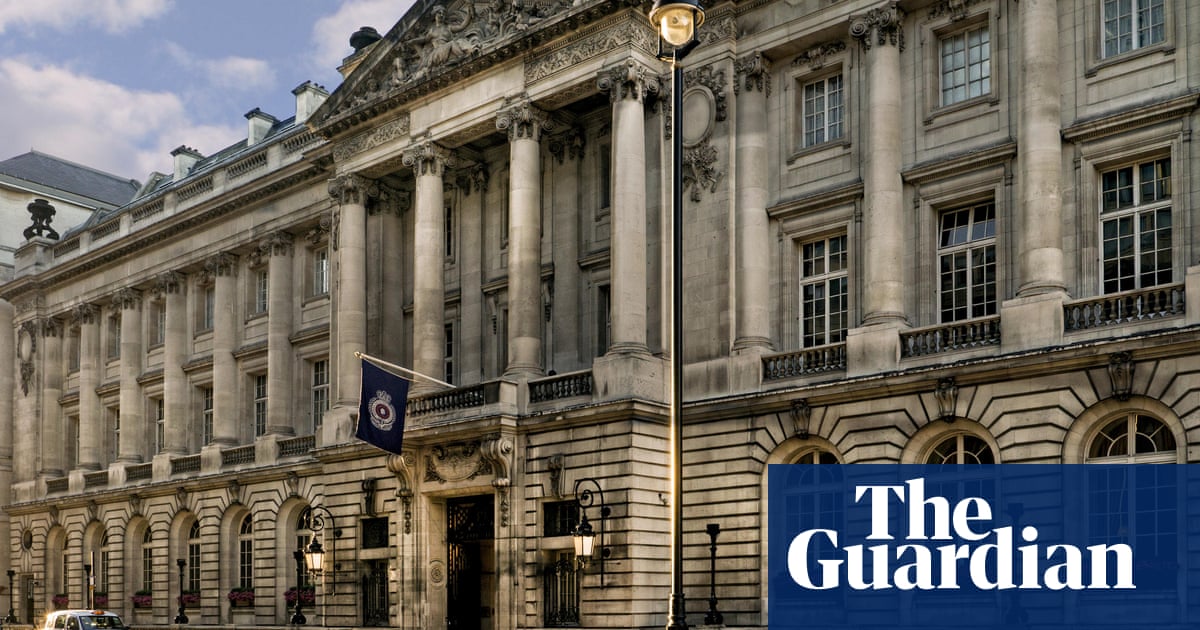
Water company bosses and the chairs of the regulator Ofwat and the Environment Agency went for dinner at an exclusive private members’ club to discuss how to quell public anger over bill rises and sewage spills, the Guardian can reveal.
Campaigners have said the private meeting is an outrageous example of “regulatory capture” as Ofwat and the Environment Agency are supposed to hold water companies to account, rather than help with their public relations.
Iain Coucher, the chair of Ofwat, and Alan Lovell, who chairs the Environment Agency, met for dinner with Gill Rider, the chair of South West Water, Christine Hodgson, who runs Severn Trent, and Keith Lough, the chair of Southern Water. Heidi Mottram, the CEO of Northumbrian Water, was also invited but did not, it is understood, attend.
Emails between those who attended, revealed to the Guardian under freedom of information laws, indicate that the dinner was the third held in 2023 as part of continuing discussions about how to handle communications around sewage spills and bill rises. These issues have attracted huge public outcry because of the environmental destruction caused by the dumping of human waste in English waterways.
On this particular occasion, referred to as the “chair’s dinner” in the emails, the water bosses and government representatives met on the 25 September to eat in the opulent Segrave room, a private dining room in the Royal Automobile Club (RAC), Pall Mall. The menus for the restaurants at the RAC offer venison and wild mushroom pie for £26.75, a tasting menu at £90 a head, or a fish pie for £19.
The exclusive club is called “the palace in Pall Mall” and says on its website that it “boasts a dining experience for every occasion”, as well as 108 bedrooms, a business centre, a marble swimming pool and Turkish baths, four squash courts, a gym and treatment rooms. Annual membership of the club costs £2,230. It’s a favourite club of the royals, and is currently chaired by Prince Michael of Kent. The RAC is a haunt of businessmen, counting many millionaires among its members.
In the gilded dining room, the group were greeted with drinks at 6.30pm, and were served dinner at 7pm. The FoI emails reveal that the Ofwat and Environment Agency chiefs discussed topics including “navigating the coming months, particularly to manage perceptions”.
They discussed how to shape the conversation around bill rises when these are announced to the public, with emails revealing they asked: “Given the debate on bills/affordability how do we carefully message the increases?” and “How do we describe the ambition of the plans (national infrastructure improvements, storm overflow management etc), balancing between addressing heightened scrutiny and affordable and deliverable outcomes?”
The water quality campaigner and former Undertones frontman Feargal Sharkey said the private dinner was outrageous and an example of “regulatory capture”. He said: “In my view here we have a clear case of regulatory capture – industry and regulators, both of which are currently under enormous amounts of public scrutiny and criticism, acting in tandem trying to avoid anything remotely looking like transparency and/or accountability. This is pretty damned outrageous.” He also called for the chairs to resign.
James Wallace, the CEO of River Action UK, added: “It is outrageous that the government is holding private meetings – using taxpayers’ money – with water industry bosses on how to greenwash their dreadful performance on river and coastal pollution. One minute they threaten prosecution, the next they guzzle Château Margaux.
“While they schmooze over how to spin bad news as good, we the public are wading through the poisonous effluent of their combined malpractice and ineptitude.”
The 11 water suppliers in England and Wales will in the coming days publish their new household charges, which will take effect from April. In early February, the industry body Water UK will then announce how much bills have increased on average. Last year they went up by £31 to £448. The likely announcement of a price hike will anger the public after years of sewage dumping, high executive pay, debt levels and big dividends.
It is possible that this was discussed further at another recent dinner: an email from Lovell to the attenders confirms another meal to be held in January 2024, weeks before the bill hikes were to be announced.
He said the September 2023 dinner was a “productive discussion between attendees”, adding that he looked forward to the next. He also asked the water companies to release storm overflow – sewage pollution – data early, on 1 January 2024. They did not do this.
Another hot topic on the agenda at the dinner were the “events at Thames Water”. The beleaguered company has faced financial woes and auditors have warned that without a cash injection it could go under by April. Last year, it emerged that contingency plans for its collapse were being drawn up by the UK government, amid fears that Britain’s biggest water company would not survive because of its huge debt pile. Other water companies are thought to be facing similar, though less severe, financial pressures.
Severn Trent, Northumbrian Water, Southern Water and South West Water declined to comment on the record.
An Ofwat spokesperson said: “Ofwat remains focused on holding water companies to account on behalf of customers and has imposed fines and performance penalties worth £250m in the past few years. At this meeting we made clear to the chairs of water companies our dissatisfaction on progress in reducing pollution, the use of storm overflows, and concerns about the impact of proposed bill rises on customers, especially the most vulnerable.”
An Environment Agency spokesperson said: “It is not unusual for the Environment Agency chair to meet his counterparts at water companies. These are working meetings used to challenge companies on their performance and drive forward improvements that we, as a regulator, expect to see. To suggest otherwise would be highly inaccurate.
“At the September 2023 meeting, the EA chair made clear his disappointment with water company performance; reiterated the need for rapid investment and the sharing of good practice, and outlined actions he would be taking forward at the Environment Agency, including continued rigorous enforcement.
“We are continuing to robustly hold water companies to account, with strengthened regulation and £150m in fines secured through prosecutions since 2015.”












